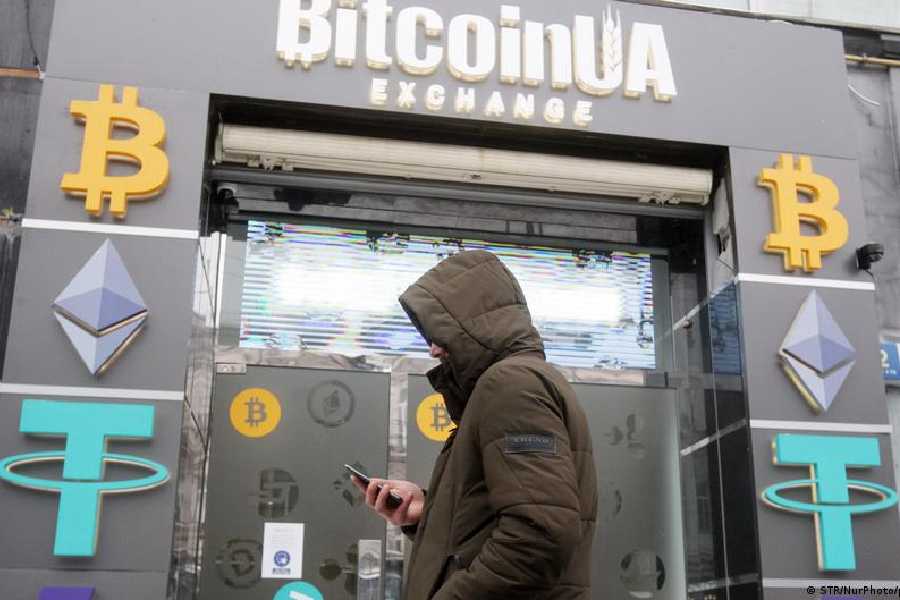Bitcoin hit a record high of over $69,000 (€63,000) this week before falling slightly, stunning investors with a remarkable recovery following the cryptocurrency's plunge in 2022 amidst market turmoil. Bitcoin's price has surged by over 300% compared with November 2022, when it had dipped below $20,000.
The cryptocurrency's market capitalization also hit a record high of nearly $1.35 trillion. The combined value of the total crypto market currently stands at around $2.5 trillion, its highest level since November 2021 and just 10% below its all-time high of $2.8 trillion.
Bitcoin's resurgence can largely be attributed to investor enthusiasm surrounding a new financial product linked to the digital coin: bitcoin ETFs. Anticipation for these ETFs, or exchange-traded funds, sparked months of speculation, culminating in a frenzy of institutional activity following their debut on January 10 this year.
These funds make it easier for investors to gain exposure to bitcoin without directly owning the virtual currency. According to Bloomberg Intelligence, investors have poured over $7 billion into these investment products, propelling bitcoin's rapid ascent. US financial regulators were long wary of allowing bitcoin ETFs, citing concerns about fraud and manipulation.
"[The favorable climate for bitcoin in the US] is not because US regulators want to be more favorable," Jonathan Biers, chief investment officer at Farside Investors, a UK-based equity investment fund, told DW. "It's mostly driven by court victories from the crypto industry, who have beaten the SEC in courts, resulting in a more favorable regulatory climate and more legitimacy, which is attracting more flow from American investors."
Alongside crypto's rally, gold has also reached record highs, sending mixed messages about traders' appetite for risk across global markets.
Historically an investor safe haven, gold is often sought in times of geopolitical tensions and when investors are concerned about a potential pullback in global stocks after a rally. The value of gold has risen steadily since October when the war between Israel and Hamas broke out. Stock markets have also hit all-time highs in recent months. Many suspect a correction is due soon.
The rise of gold stands in contrast to that of bitcoin, whose utility beyond speculative investment remains a subject of debate. While gold's ascent suggests investors are acting defensively, bitcoin's surge reflects a hunger for digital assets fueled by speculative fervor and technological innovation.
"The crypto story can be tied in with what is happening in equity markets and broader risk-taking," Kyle Rodda, senior market analyst with Capital.com, told Bloomberg. "We're seeing a resurgence in meme coins that suggests irrational, risk-taking behavior — which is consistent with what is happening in some parts of the equity market."
Signals from the US Federal Reserve that interest rates are likely to come down this year could also be fueling the rally, as investors anticipate lower borrowing costs.
Bitcoin emerged in the aftermath of the 2008 financial crisis as a decentralized alternative to traditional finance. Initially conceived for peer-to-peer transactions, its value surged in the years that followed, inviting speculation and extreme volatility. Amateur day trading during the pandemic exacerbated its rise. But the bubble eventually burst, marked by corporate collapses like that of the major cryptocurrency exchange FTX in November 2022, which wiped out billions in investor wealth and sent bitcoin's value plummeting to around $16,000.
"FTX was essentially a fraudulent business," said Bier, "so of course, it's a good thing for society that this fraud was exposed and collapsed."
So what comes next? Bitcoin's impending "halving" event, programmed into its underlying code, is set to reduce the amount of new bitcoins entering circulation by half.
Bitcoin is produced through a process called "mining," where powerful computers solve complex mathematical puzzles to verify and record transactions on the blockchain, earning "miners" new bitcoins as a reward. Halving events, which occur approximately every four years, reduce the reward given to miners, slowing down the rate at which new bitcoins are generated.
This scarcity of bitcoin supply has been cited by analysts as a driving force behind its recent price surge. With the halving expected to occur this spring, bitcoin fans anticipate further price jumps.
However, critics remain skeptical of the digital asset, highlighting concerns about its utility and regulatory challenges in the aftermath of the 2022 crash.
"There's no inherent value," John Reed Stark, a former SEC official and an outspoken critic of the crypto industry, told the New York Times. "There's no proven track record of adoption or reliance."











